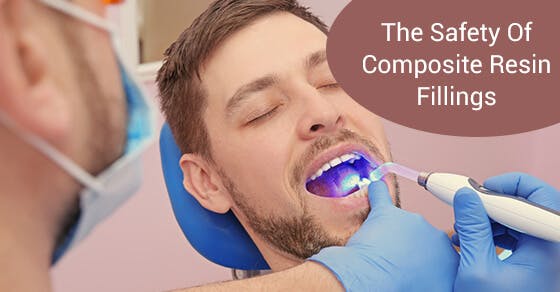Are Composite Resin Fillings Safe?

Dentists and patients are increasingly opting for composite resin fillings as an alternative to amalgam fillings, largely due to their aesthetic appeal, and also because of mercury concerns. However, there have been claims that composite resin fillings may be damaging to health. In this post, we examine the concerns associated with composite resin fillings.
Health Concerns with Composite Resin Fillings
Composite resin fillings typically are comprised of three components: inorganic fillers, a resin matrix, and coupling agents. The resin matrices for most dental composite resins today contain Bis-GMA, which is made from the Bisphenol-A (BPA) monomer that is believed to induce similar effects to estrogen in the human body.
As an endocrine disruptor, BPA is linked to a number of concerns if introduced into the body, including:
- Disrupted hormone levels – Experts argue that BPA can induce similar effects to hormones in the body, disrupting the development of fetuses and babies. However, animal studies are yet to yield any conclusive results.
- Brain and behaviour issues – Based on multiple studies, the National Toxicology Program at the FDA has expressed concerns about the likely effects of BPA on the brain and behaviour of young children and infants.
- Heart conditions – Studies suggest that high levels of BPA in adults increase the risk of heart problems, though the results are not conclusive.
- Cancer – Animal studies suggest that exposure to BPA increases the risk of cancer.
Some studies have found evidence of BPA in the saliva of patients following fillings or sealants. Although the presumed effects of BPA could be most harmful to children and infants, because of their underdeveloped immune systems, experts are not certain whether this level of exposure constitutes any health risk to fetuses, children, or adults. Moreover, the dental community argues that the composite resin fillings and sealants that contain BPA are not harmful in any way.
Verdict
Although there are no BPA human studies, the US FDA does not believe that BPA is a public health concern, and maintains that composite resins containing Bisphenol-A can be safely used.
Moreover, there are other ways that humans are exposed to greater levels of BPA, like through foods and drinks in plastic cups, bottles, and wraps, as well as soda cans and canned products, among other products. In comparison, the levels of exposure found with dental composite resin fillings are miniscule.
In Conclusion, composite resin fillings are a safe option for restoring damaged teeth. But if you are concerned about BPA, you can talk to your dentist about using a BPA-free composite resin filling material that does not contain the conventional monomers such as Bis-GMA, HEMA, UDMA or TEGDMA.
Book Online
Roots on Whyte Dental offers the ability to request your dentist appointments online. Schedule an appointment now!
Book OnlineNew Patient Forms
By filling out the New Patient Forms ahead of time you will save significant time on your visit.
New Patient Forms